December's Written Primary Source for the History Classroom
Activities for the History Classroom
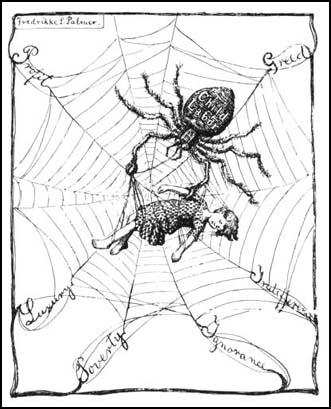
16th December, 2021: Eugene Debs, Appeal to Reason (29th December, 1900)
The machine became more perfect day by day; is lowered the wage of the worker, and in due course of time it became so perfect that it could be operated by unskilled labor of the woman, and she became a factor in industry. The owners of these machines were in competition with each other for trade in the market; it was war; cheaper and cheaper production was demanded, and cheaper labor was demanded.
In the march of time it became necessary to withdraw the children from school, and these machines came to be operated by the deft touch of the fingers of the child. In the first stage, machine was in competition with man; in the next, man in competition with both, and in the next, the child in competition with the whole combination.
Today there is more than three million women engaged in industrial pursuits in the United States, and more than two million children. It is not a question of white labor or black labor, or male labor or female or child labor, in this system; it is solely a question of cheap labor, without reference to the effect upon mankind.
Question: In 1916 Congress made its first effort to control child labour by passing the Keating-Owen Act. The legislation forbade the transportation among states of products of factories, shops or canneries employing children under 14 years of age, of mines employing children under 16 years of age, and the products of any of these employing children under 16 who worked at night or more than eight hours a day. In 1918 the Supreme Court ruled that the Keating-Owen Act was unconstitutional.
After the Supreme Court ruled that the Keating-Owen Act was unconstitutional, Congress passed a Second Child Labor Law. This levied a tax of ten per cent on the net profits of factories employing children under the age of 14, and of mines and quarries employing children under the age of 16. This legislation was declared unconstitutional as a result of the Drexel Furniture Company case in 1922.
Grace Abbott, who had replaced Julia Lathrop as head of the Children's Bureau in 1921, advocated that the only way this problem could be solved was by a change in the Constitution. In 1924 Congress passed an amendment to the Constitution giving itself the right to regulate child labour under 16 years of age. However, only 28 states ratified this Amendment.
Read Eugene Debs article in Appeal to Reason (29th December, 1900) and explain why it took so long for the United States to ban child labour.
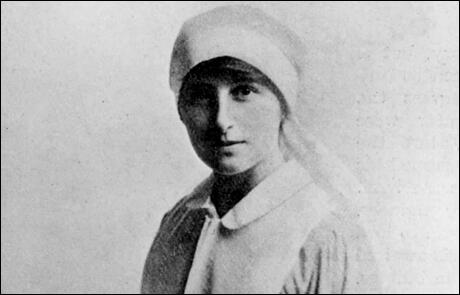
15th December, 2021: Vera Brittain, letter to Roland Leighton (10th September, 1915)
What do you think of this for an "agony" in The Times? "Lady, fiancé killed, will gladly marry officer totally blinded or otherwise incapacitated by the War."
At first sight it is a little startling. Afterwards the tragedy of it dawns on you. The lady (probably more than a girl or she would have called herself "young lady"; they always do) doubtless has no particular gift or qualification, and does not want to face the dreariness of an unoccupied and unattached old mainenhood. But the only person she loved is dead; all men are alike to her and it is a matter of indifference whom she marries, so she thinks she may as well marry someone who really needs her. The man, she thinks, being blind or maimed for life will not have much opportunity of falling in love with anyone and even if he does will not be able to say so. But he will need a perpetual nurse, and she if married to him can do more for him than an ordinary nurse and will perhaps find some relief for her sorrow in devoting her life to him.... It is purely a business arrangement, with an element of self-sacrifice which redeems it from utter sordidness. Quite an idea, isn't it!
Question: Vera Brittain worked as a Voluntary Aid Detachment (VAD) nurse in the First World War. Her boyfriend, Roland Leighton, served on the Western Front until he was killed in December, 1915. A second boyfriend, Geoffrey Thurlow was killed in action in April 1917, and her brother, Edward Brittain was killed in July, 1918. What does this letter tell you about the attitude of young women to relationships with the opposite sex?
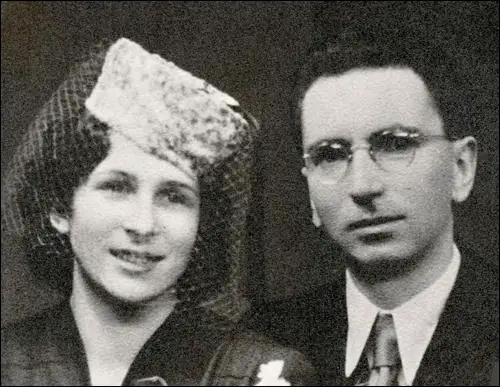
14th December, 2021: Victor Frankl, From Death-Camp to Existentialism (1946)
This story is not about the suffering and death of great heroes and martyrs, nor is it about the prominent Kapos - prisoners who acted as trustees, having special privileges - or well-known prisoners. Thus it is not so much concerned with the sufferings of the mighty, but with the sacrifices, the crucifixion and the deaths of the great army of unknown and unrecorded victims. It was these common prisoners, who bore no distinguishing marks on their sleeves, whom the Kapos really despised. While these ordinary prisoners had little or nothing to eat, the Kapos were never hungry; in fact many of the Kapos fared better in the camp than they had in their entire lives. Often they were harder on the prisoners than were the guards, and beat them more cruelly than the SS men did. These Kapos, of course, were chosen only from those prisoners whose characters promised to make them suitable for such procedures, and if they did not comply with what was expected of them, they were immediately demoted. They soon became much like the SS men and the camp wardens and may be judged on a similar psychological basis....
In spite of all the enforced physical and mental primitiveness of the life in a concentration camp, it was possible for spiritual life to deepen. Sensitive people who were used to a rich intellectual life may have suffered much pain (they were often of a delicate constitution), but the damage to their inner selves was less. They were able to retreat from their terrible surroundings to a life of inner riches and spiritual freedom. Only in this way can one explain the apparent paradox that some prisoners of a less hardy make-up often seemed to survive camp life better than did those of a robust nature....
Humour was another of the soul's weapons in the fight for self-preservation. It is well known that humour, more than anything else in the human make-up, can afford an aloofness and an ability to rise above any situation, even if only for a few seconds. I practically trained a friend of mine who worked next to me on the building site to develop a sense of humour. I suggested to him that we would promise each other to invent at least one amusing story daily, about some incident that could happen one day after liberation.
Question: Victor Frankl was born in Vienna into a Jewish family. Frankl became a socialist and joined the Social Democratic Party of Austria. In 1924 he became the president of its youth organization. Later that year he entered the University of Vienna to study medicine and over this period he specialized in neurology and psychiatry, concentrating on the topics of depression and suicide. In 1940, becomes director of the Neurological Department of the Rothschild Hospital, a clinic for Jewish patients. This hospital was the only one in Vienna to which Jews were still admitted. In spite of the danger to his own life he sabotages Nazi procedures by making false diagnoses to prevent the euthanasia of mentally ill patients. Frankl obtained an immigration visa to America but did not use it because he does not want to desert his old parents.
The next month his entire family, except for a sister who had left the country, was arrested in a general roundup of Jews. The family had expected the roundup, as his wife, Tilly Frankl, sewed the manuscript of the book he was writing on his developing theories of psychotherapy into the lining of his coat. After their arrival at Auschwitz, Frankl was separated from his family. His own clothes were replaced with prison clothes, and the manuscript was lost. Frankl's father died there of starvation and pneumonia. His mother and brother were gassed. His wife died later of typhus in Bergen-Belsen.
Concentration camps were controlled by the Schutzstaffel (SS), but day-to-day organization was supplemented by the system of prisoners, Kapos, a second hierarchy that made it easier for the Nazis to control the camps. These prisoners made it possible for the camps to function with the minimum number of German soldiers, who were needed to fight on the front-line. The Kapos often did this work for extra food, cigarettes, alcohol or other privileges as well as being protected from being executed.
Describe the different ways that people managed to survive in concentration camps.
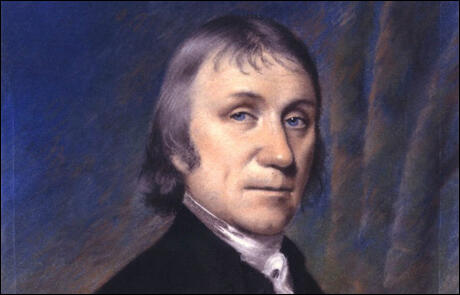
13th December, 2021: Joseph Priestley, An Essay on the First Principles of Government (1768)
In the largest states, if the abuses of government should, at any time be great and manifest; if the servants of the people, forgetting their masters, and their masters' interest, should pursue a separate one of their own; if, instead of considering that they are made for the people, they should consider the people as made for them; if the oppressions and violations of right should be great, flagrant, and universally resented; if the tyrannical governors should have no friends but a few sycophants, who had long preyed upon the vitals of their fellow citizens, and who might be expected to desert a government, whenever their interests should be detached from it: if, in consequence of these circumstances, it should become manifest, that the risk, which would be run in attempting a revolution would be trifling, and the evils which might be apprehended from it, were far less than these which were actually suffered, and which were daily increasing; in the name of God, I ask, what principles are those, which ought to restrain an injured and insulted people from asserting their natural rights, and from changing, or even punishing their governors that is their servants, who had abused their trust; or from altering the whole form of their government, if it appeared to be of a structure so liable to abuse?
To say that these forms of government have been long established, and that these oppressions have been long suffered, without any complaint, is to supply the strongest argument for their abolition. Nothing can more justly excite the indignation of an honest and oppressed citizen, than to hear a prelate, who enjoys a considerable benefice, under a corrupt government, pleading for its support by those abominable perversions of scripture, which have been too common on this occasion; as by urging in its favour that passage of St Paul, "The powers which be are ordained of God", and others of a similar import. It is a sufficient answer to such an absurd quotation as this, that, for the same reason, the powers which will be will be ordained of God also.
It will be said, that it is opening a door to rebellion, to assert that magistrates, abusing their power, may be set aside by the people, who are of course their own judges when that power is abused. May not the people, it is said, abuse their power, as well as their governors? I answer, it is very possible they may abuse their power: it is possible they may imagine themselves oppressed when they are not: it is possible that their animosity may be artfully and unreasonably inflamed, by ambitious and enterprising men, whose views are often best answered by popular tumults and insurrections; and the people may suffer in consequence of their folly and precipitancy. But what man is there, or what body of men (whose right to direct their own conduct was never called in question) but are liable to be imposed upon, and to suffer in consequence of their mistaken apprehensions and precipitate conduct?
English history will inform us, that the people of this country have always borne extreme oppression, for a long time before there has appeared any danger of a general insurrection against the government.
Question: Joseph Priestley was a scientist and a member of the Unitarian Church. Priestley published several books. In Liberal Education for Civil and Active Life (1765) he stressed the importance of science, arts, modern languages and history and argued they were better suited than the classics for those students who wanted a career in industry and commerce. This was followed by a book on science The History and Present State of Electricity (1767). In the book Priestley put forward the theory that the history of science was important because it showed how human intelligence discovers and directs the forces of nature, as well as illustrating the general progress of mankind.
In 1768 his book The First Principles of Government and the Nature of Political, Civil and Religious Liberty was published. In the book he argued for the development of a political system that maximizes civil liberty. It included the words: "The good and happiness of the members, that is the majority of the members of the state, is the great standard by which every thing relating to that state must finally be determined." How does the passage above explain his views on religion and politics?
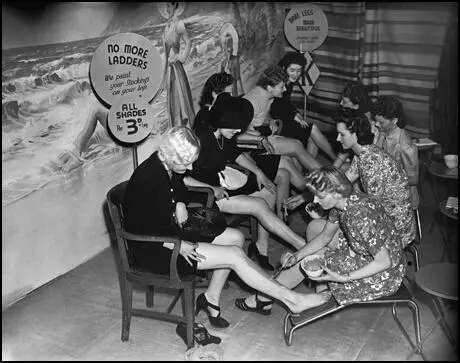
10th December, 2021: Helen Forrester, Lime Street at Two (1985)
Over several lunches, the girls in the office discussed the situation, and agreed that stockings were out. We shaved our legs and went barelegged. Our skin looked horribly white, and all wrong with heavy shoes. So we experimented with painting the part that showed. Liquid makeup was the most effective. But cosmetics were expensive and increasingly difficult to obtain; it took nearly a bottle of liquid makeup to paint two legs. One girl swore by gravy browning, and even went as far as drawing a careful line up the backs of her legs with her eyebrow pencil, to give a resemblance to a stocking seam. But most mothers objected to losing their carefully hoarded gravy browning! This problem was solved by enterprising firms who made up large bottles of what felt like tinted whitewash. It was difficult to get it on smoothly, but the general effect satisfied us, and we all went to work triumphantly, with painted legs.
Question: Read Helen Forrester's account of rationing in the Second World War and look at the photograph above and explain what is meant by "customers save their ration coupons"?
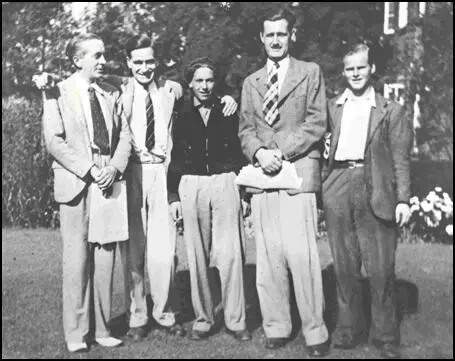
9th December, 2021: George Orwell, Homage to Catalonia (1938)
I had been about ten days at the front when it happened. The whole experience of being hit by a bullet is very interesting and I think it is worth describing in detail.
It was at the corner of the parapet, at five o'clock in the morning. This was always a dangerous time, because we had the dawn at our backs, and if you stuck your head above the parapet it was clearly outlined against the sky. I was talking to the sentries preparatory to changing the guard. Suddenly, in the very middle of saying something, I felt - it is very hard to describe what I felt, though I remember it with the utmost vividness.
Roughly speaking it was the sensation of being at the centre of an explosion. There seemed to be a loud bang and a blinding flash of light all round me, and I felt a tremendous shock - no pain, only a violent shock, such as you get from an electric terminal; with it a sense of utter weakness, a feeling of being stricken and shrivelled up to nothing. The sandbags in front of me receded into immense distance. I fancy you would feel much the same if you were struck by lightning. I knew immediately that I was hit, but because of the seeming bang and flash I thought it was a rifle nearby that had gone off accidentally and shot me. All this happened in a space of time much less than a second. The next moment my knees crumpled up and I was falling, my head hitting the ground with a violent bang which, to my relief, did not hurt. I had a numb, dazed feeling, a consciousness of being very badly hurt, but no pain in the ordinary sense.
The American sentry I had been talking to had started forward. Gosh! Are you hit?' People gathered round. There was the usual fuss - 'Lift him up! Where's he hit? Get his shirt open!' etc., etc. The American called for a knife to cut my shirt open. I knew that there was one in my pocket and tried to get it out, but discovered that my right arm was paralysed. Not being in pain, I felt a vague satisfaction. This ought to please my wife, I thought; she had always wanted me to be wounded, which would save me from being killed when the great battle came. It was only now that it occurred to me to wonder where I was hit, and how badly; I could feel nothing, but I was conscious that the bullet had struck me somewhere in the front of the body. When I tried to speak I found that I had no voice, only a faint squeak, but at the second attempt I managed to ask where I was hit. In the throat, they said. Harry Webb our stretcher-bearer, had brought a bandage and one of the little bottles of alcohol they gave us for field-dressings. As they lifted me up a lot of blood poured out of my mouth, and I heard a Spaniard behind me say that the bullet had gone clean through my neck. I felt the alcohol, which at ordinary times would sting like the devil, splash onto the wound as a pleasant coolness.
They laid me down again while somebody fetched a stretcher. As soon as I knew that the bullet had gone clean through my neck I took it for granted that I was done for. I had never heard of a man or an animal getting a bullet through the middle of the neck and surviving it. The blood was dribbling out of the corner of my mouth. 'The artery's gone,' I thought. I wondered how long you last when your carotid artery is cut; not many minutes, presumably. Everything was very blurry. There must have been about two minutes during which I assumed that I was killed. And that too was interesting - I mean it is interesting to know what your thoughts would be at such a time. My first thought, conventionally enough, was for my wife. My second was a violent resentment at having to leave this world which, when all is said and done suits me so well. I had time to feel this very vividly. The stupid mischance infuriated me. The meaninglessness of it! To be bumped off, not even in battle, but in this stale corner of the trenches, thanks to a moment's carelessness! I thought too of the man who had shot me - wondered what he was like, whether he was a Spaniard or a foreigner, whether he knew he had got me, and so forth. I could not feel any resentment against him. I reflected that as he was a Fascist I would have killed him if I could, but that if he had been taken prisoner and brought before me at this moment I would merely have congratulated him on his good shooting. It may be, though, that if you were really dying your thoughts would be quite different.
Question: As soon as the Spanish Civil War began on 18th July, 1936, despite only being married for a month George Orwell immediately decided to go and support the Popular Front government against the fascist forces led by General Francisco Franco. Read the article on the International Brigades and explain why people like Orwell were willing to risk their lives fighting in a war that did not involve their own country.
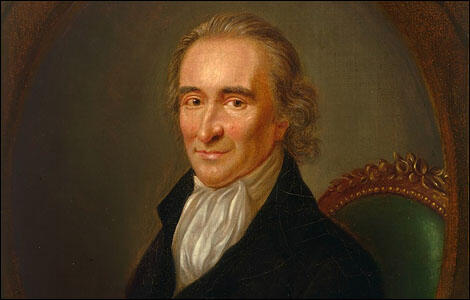
8th December, 2021: Tom Paine, The Rights of Man (1791)
(1) What is government more than the management of the affairs of a Nation? It is not, and from its nature cannot be, the property of any particular man or family, but the whole community. The romantic and barbarous distinction of men into Kings and subjects, though it may suit the condition of courtiers, cannot that of citizens.
(2) We have heard The Rights of Man called a levelling system; but the only system to which the word levelling is truly applicable is the hereditary monarchical system. It is a system of mental levelling. It indiscriminately admits every species of character to the same authority. Vice and virtue, ignorance and wisdom, in short, every quality, good or bad, is put on the same level. Kings succeed each other, not as rationals, but as animals. In reverses the wholesome order of nature. It occasionally puts children over men, and the conceits of nonage over wisdom and experience. In short we cannot conceive a more ridiculous figure of government, than hereditary succession.
(3) It is inhuman to talk of a million sterling a year, paid out of the public taxes of any country, for the support of any individual, while thousands who are forced to contribute thereto, are pining with want, and struggling with misery. What is called the splendour of a throne is no other than the corruption of the state. It is made up of a band of parasites, living in luxurious indolence, out of the public taxes.
(4) The county of Yorkshire, which contains near a million souls, sends two county members; and so does the county of Rutland which contains not a hundredth part of that number. The town of Old Sarum, which contains not three houses, sends two members; and the town of Manchester, which contains upwards of sixty thousand souls, is not admitted to send any. Is there any principle in these things?
Question: Explain Tom Paine's arguments in favour of universal suffrage. Why did Paine believe that in a democracy it was difficult to justify a "hereditary monarchical system"?
Do you agree or disagree with the following Tom Paine quotes:
One good schoolmaster is of more use than a hundred priests.
I believe in the equality of man; and I believe that religious duties consist in doing justice, loving mercy, and endeavoring to make our fellow-creatures happy.
The strength and power of despotism consists wholly in the fear of resistance.
It is error only, and not truth, that shrinks from inquiry.
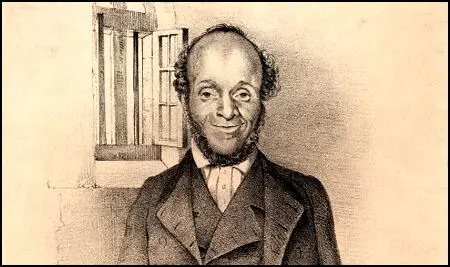
7th December, 2021: William Cuffay, statement in court after being found guilty of conspiracy (30 September, 1848)
The present Government is now supported by a regular organized system of espionage which is a disgrace to this great and boasted free country. The locality to which I belong never approved of any violence of this sort and never sent any delegates to any such meetings, and that you will find proved in the trials of my fellow prisoners who have not yet been tried. They sent no delegates, and consequently there were no luminaries nor firebrands sent to Orange Street from that locality. That is another reason why I should not be sentenced; that will be hereafter proved. Then I have to complain of the Whig manoeuvres of keeping the spy Davis back to the last moment after he had had an opportunity of reading the evidence in the newspaper and seeing what was deposed to, and then coming here with a statement written out by the inspectors of police against me and filling up all the discrepancies in the evidence of the principal spy, that miscreant with so many aliases, Powell being his proper name, it seems.
I say you have no right to sentence me. Although the trial has lasted a long time, it has not been a fair trial, and my request to have a fair trial - to be tried by my equals - has not been complied with. Everything has been done to raise a prejudice against me, and the press of this country - and I believe of other countries too - has done all in its power to smother me with ridicule. I ask no pity. I ask no mercy. I expected to be convicted, and I did not think anything else. No, I pity the Government, and I pity the Attorney General for convicting me by means of such base characters. The Attorney General ought to be called the Spy General. I am not anxious for martyrdom, but after what I have endured this week, I feel that I could bear any punishment proudly, even to the scaffold.
Question: In the summer of 1848 a government spy called Powell provided information on a group of London Chartists. Based on the evidence acquired by Powell, William Cuffay was arrested and brought before the courts. Cuffay was convicted and sentenced to be transported to Tasmania for 21 years.
What did Cuffay mean when he said: "Everything has been done to raise a prejudice against me, and the press of this country - and I believe of other countries too - has done all in its power to smother me with ridicule. I ask no pity. I ask no mercy. I expected to be convicted, and I did not think anything else.... The Attorney General ought to be called the Spy General. I am not anxious for martyrdom, but after what I have endured this week, I feel that I could bear any punishment proudly, even to the scaffold."
5th December, 2021: John Tyas, The Times (19th August, 1819)
A club of Female Reformers, amounting in numbers, according to our calculations, 150 came from Oldham; and another, not quite so numerous, from Royton. The first bore a white silk banner, by far the most elegant displayed during the day, inscribed "Major Cartwright's Bill, Annual Parliaments, Universal Suffrage, and Vote by Ballot". The females of Royton bore two red flags, the one inscribed 'Let us die like men, and not sold like slaves'; the other "Annual Parliaments and Universal Suffrage".
A group of women of Manchester, attracted by the crowd, came to the corner of the street where we had taken our post. They viewed the Oldham Female Reformers for some time with a look in which compassion and disgust was equally blended, and at last burst out into an indignant exclamation - "Go home to your families, and leave to your husbands and sons, who better understand them." The women who addressed them were of the lower order of life.
Question: John Tyas is describing the meeting St. Peter's Field on 16th August, 1819, where men demanded the vote. Were the women at the meeting demanding the vote for men or women? Did all women agree on this issue? It might help you to read about the Female Reform Union.
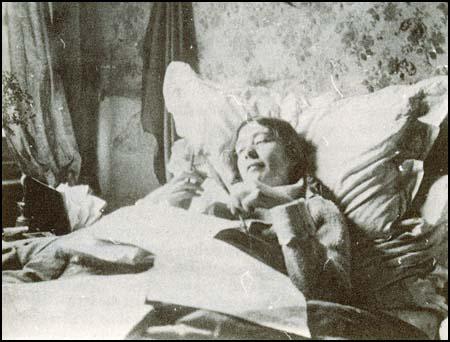
3rd December, 2021: Sylvia Pankhurst described this new militant policy of the Women's Social and Political Union in her book The Suffrage Movement (1931).
Street lamps were broken, keyholes were stopped up with lead pellets. House numbers were painted out, cushions of railway carriages slashed, flower-beds damaged, golf-greens all over the country scraped and burnt with acid… Old ladies applied for gun licences to terrify the authorities. Telegraph and telephone wires were severed with long-handled clippers; fuse boxes were blown up, communications between London and Glasgow being cut off for some hours. There was a window-smashing raid in the West End, the Carlton, the Reform Club and others were attacked. Boat houses and sports pavilions and a grandstand at Ayr racecourse were burnt down. Works of art and objects of exceptional value were destroyed. Empty houses and other unattended buildings were set on fire. Bombs were placed near the Bank of England, at Oxted Station, and on the steps of a Dublin insurance office.
Question: Sylvia Pankhurst left the Women's Social and Political Union in 1913. Unlike her mother, Emmeline Pethick-Lawrence, and her sister, Christabel Pankhurst, Sylvia opposed Britain's participation in the First World War. What might be the reasons for these two policy decisions.
2nd December, 2021: Samuel Bamford was in the crowd that was attacked by the Manchester & Salford Yeomanry on the 16th August, 1819. He wrote about it his autobiography, Passage in the Life of a Radical (1843)
Mr. Hunt, stepping towards the front of the stage, took off his white hat, and addressed the people. Whilst he was doing so I heard a noise outside the crowd. Some persons said it was the Blackburn people coming, and I stood on tip-toe and looked in the direction whence the noise was coming from, I saw a party of cavalry in blue and white uniform come trotting, sword in hand.
The cavalry received a shout of good-will. The cavalry, waving their sabres over their heads; and then, slackening rein, and striking spur into their seeds, they dashed forward and began cutting the people. "Stand fast," I said, "they are riding upon us;" The cavalry were in confusion; they evidently could not, with the weight of man and horse, penetrate that compact mass of human beings; and their sabres were plied to cut a way through naked held-up hands and defenceless heads. "Shame!" was shouted then "break! break!" they are killing them in front, and they cannot get away." On the breaking of the crowd the yeomanry wheeled, and, dashing whenever there was an opening, they followed, pressing and wounding. Women and tender youths were indiscriminately sabred or trampled.
A number of our people were driven to some timber which lay at the foot of the wall of the Quakers' meeting house. Being pressed by the yeomanry, a number sprung over the balks and defended themselves with stones which they found there. It was not without difficulty, and after several were wounded, they were driven out. A young married woman of our party, with her face all bloody, her hair streaming about her, her bonnet hanging by the string, and her apron weighed with stones, kept her assailant at bay until she fell backwards and was near being taken; but she got away covered with severe bruises.
In ten minutes from the commencement of the havoc the field was an open and almost deserted space. The hustings remained, with a few broken and hewed flag-staves erect, and a torn and gashed banner or two dropping; whilst over the whole field were strewed caps, bonnets, hats, shawls, and shoes, and other parts of male and female dress, trampled, torn, and bloody. Several mounds of human flesh still remained where they had fallen, crushed down and smothered. Some of these still groaning, others with staring eyes, were gasping for breath, and others would never breathe again.
Question: What are the advantages and disadvantages of this account, published 24 years after the event? Read Peterloo Massacre and explain the problems that journalists like John Tyas, Richard Carlile, James Wroe and Archibald Prentice, had in publishing their accounts of the incident.
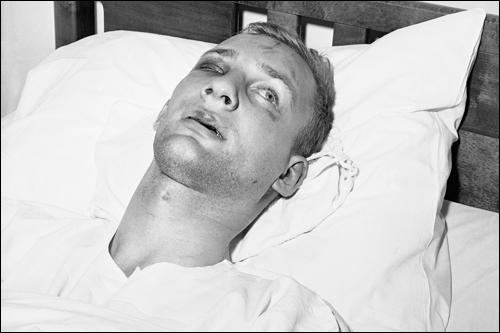
Ist December, 2021: James Zwerg was one of the Freedom Riders who lleft Washington on 17th May, 1961, for Georgia, Alabama and Mississippi. Zwerg gave an interview about his experiences in The People's Century (1995)
Q: You got involved in the Freedom Rides...
Zwerg: Well, we got word on the CORE Freedom Ride, and we knew that John Lewis, a member of our organization, was going to be involved in it. We got word of the burning in Anniston... we had a meeting long into the night as soon as we heard about it. The feeling was that if we let those perpetrators of violence believe that people would stop if they were violent enough, then we would take serious steps backwards. Right away the feeling was that we needed to ride. We called Dr. King, we called James Farmer. There was an awareness that our phones were being tapped, so the feeling was that they knew what we were about to do. Our plan was different from CORE's. Whereas they chartered their buses, we were just going to get tickets and get on the bus. We felt that was even more important -- to buy a ticket just like any other traveler. We weren't getting a special bus, we were just going to get on the bus.
It was decided that we would send twelve people. I was one of 18 that volunteered to go. I've been asked why I volunteered to go... I would have to say, at that moment, it wasn't even a question. It was the right thing for me to do. I never second-guessed it.
Q: How did you prepare?
Zwerg: After we had talked it out and I was one of those chosen to go, I went back to my room and spent a lot of time reading the bible and praying. Because of what had happened in Birmingham and in Anniston, because our phones were tapped... none of us honestly expected to live through this. I called my mother and I explained to her what I was going to be doing. My mother's comment was that this would kill my father - and he had a heart condition - and she basically hung up on me. That was very hard because these were the two people who taught me to love and when I was trying to live love, they didn't understand. Now that I'm a parent and a grandparent I can understand where they were coming from a bit more. I wrote them a letter to be mailed if I died. We had a little time to pack a suitcase and then we met to go down to the bus.
Q: What was the journey like?
Zwerg: We just got the tickets and got on the bus. I was going to sit in the front of the bus with Paul Brooks. Paul sat by the window; I sat by the aisle. The rest of the blacks and one white girl, Celine McMullen, were going to sit in the back....
Q: What were your thoughts as you rode on the bus?
Zwerg: As we were going from Birmingham to Montgomery, we'd look out the windows and we were kind of overwhelmed with the show of force - police cars with sub-machine guns attached to the backseats, planes going overhead... We had a real entourage accompanying us. Then, as we hit the city limits, it all just disappeared. As we pulled into the bus station a squad car pulled out - a police squad car. The police later said they knew nothing about our coming, and they did not arrive until after 20 minutes of beatings had taken place. Later we discovered that the instigator of the violence was a police sergeant who took a day off and was a member of the Klan. They knew we were coming. It was a set-up.
Q: You were attacked when you arrived at the bus station?
Zwerg: The idea had been that cars from the community would meet us. We'd disperse into these cars, get out into the community, and avoid the possibility of violence. And the next morning we were to come back to the station and I would use the colored services and they would go to some of the white services -- the restroom, the water fountain, etc. And then you'd get on the bus and go to the next city. It was meant to be as non-violent as possible, to avoid confrontation as much as possible.
Well, before we got off the bus, we looked out and saw the crowd. You could see things in their hands -- hammers, chains, pipes... there was some conversation about it. As we got off the bus, there was some anxiety. We started looking for the cars. But the mob had surrounded the bus station so there was no way cars could get in and we realized at that moment that we were going to get it.
There was a fellow, a reporter, with an old boom mike and he was panning the crowd. And that's when this heavy-set fellow in a white T-shirt... he had a cigar as I remember... came out and grabbed the mike and jumped on it... just smashed it... basically telling the press, "Back off! You are not going to take any pictures of this. You better stay out or you're going to get it next."
I bowed my head and asked God to give me the strength and love that I would need, that I put my life in his hands, and to forgive them. And I had the most wonderful religious experience. I felt a presence as close to me as breath itself, if you will, that gave me peace knowing that whatever came, it was okay. Before I opened my eyes, I was grabbed. I was pulled over a railing and thrown to the ground. I remember trying to get up on all fours because you try to get back to your group.
One of the things that I alluded to earlier was the strength we got from one another. To this day I'm sure I'm not the most nonviolent person in the world, but the strength of those people with me gave me strength beyond my own capabilities. Just as when we would see someone else being beaten, our hearts went to them and our strength went to them.
Q: Were you hurt?
Zwerg: Traditionally a white man got picked out for the violence first. That gave the rest of the folks a chance to get away. I was told that several tried to get into the bus terminal. I was knocked to the ground. I remember being kicked in the spine and hearing my back crack, and the pain. I fell on my back and a foot came down on my face. The next thing I remember is waking up in the back of a vehicle and John Lewis handing me a rag to wipe my face. I passed out again and when I woke up I was in another moving vehicle with some very southern-sounding whites. I figured I'm off to get lynched. I had no idea who they were. Again, I went unconscious and I woke up in the hospital. I was informed that I had been unconscious for a day and a half. One of the nurses told me that another little crowd were going to try and lynch me. They had come within a half block of the hospital. She said that she knocked me out in case they did make it, so that I would not be aware of what was happening. I mean, those pictures that appeared in the magazines, the interview... I don't remember them at all. I do remember a class of students -- I think they were high school age, coming to visit me one time.
Q: What was your family's reaction to all this?
Zwerg: My dad did have a mild coronary and my mother came close to having a nervous breakdown. One of the things that I have discovered since, after having had a chance to really talk with several of the others, is that almost all of us had some form of real emotional problems with family or personally, in one way or another. Some people had a really hard time - after having had such a tremendous support group and atmosphere of love - having to readapt.
Others have encountered some medical problems, things like that. For years and years, I was never able to discuss it with my dad. He just... you could just see the blood pressure go up. I think my mother ultimately understood. I went through some psychotherapy when I was in seminary, just because of the anger that developed. Again, these people who loved me and taught me to love didn't love what I was doing when I put my life on the line. I had to wrestle with that and work it through.
Question: Why did James Zwerg take part in the Freedom Rides? Did his parents agree with his decision to travel to the Deep South? Read the article on Congress of Racial Equality (CORE) and explain the tactics that they used to being an end to racial segregation.

